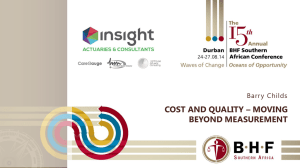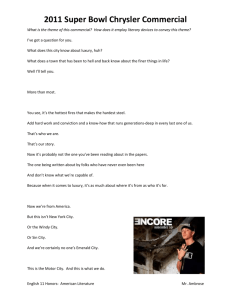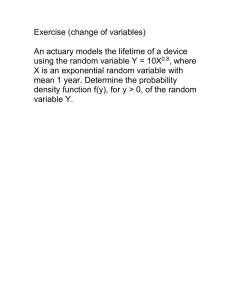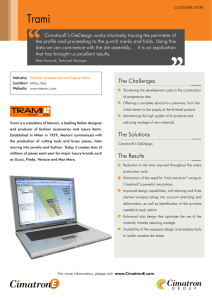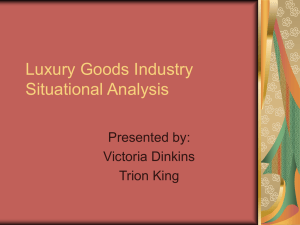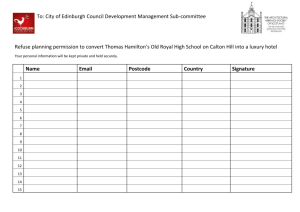The Luxury Network Newsletter T
advertisement
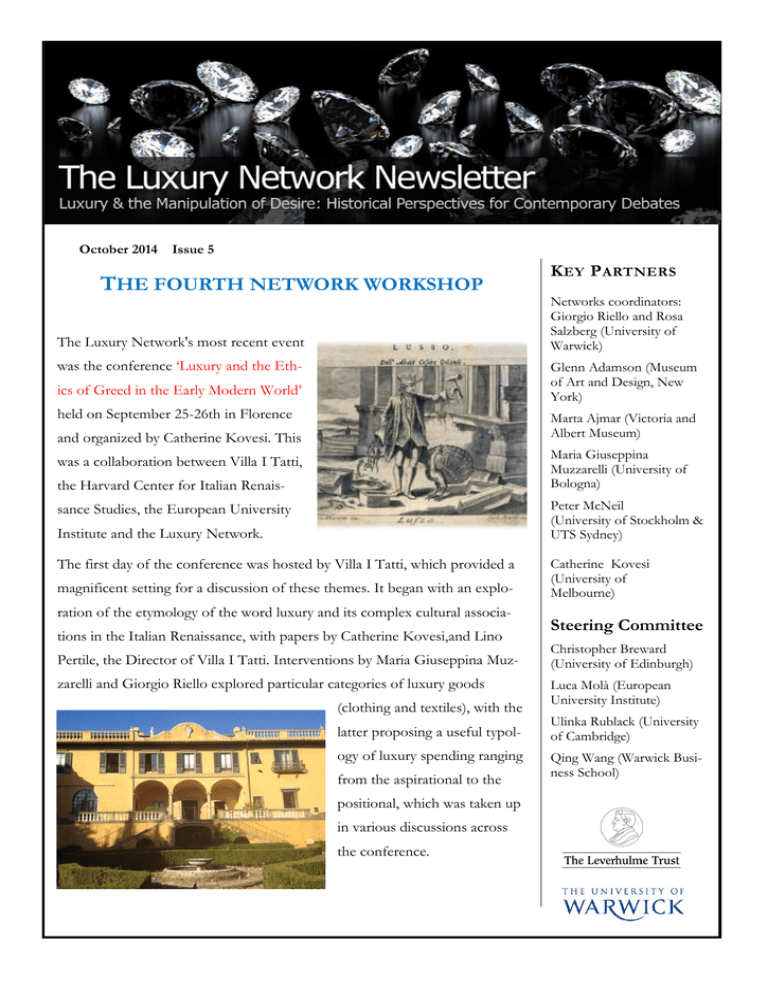
The Luxury Network Newsletter October 2014 Issue 5 THE FOURTH NETWORK WORKSHOP The Luxury Network's most recent event was the conference ‘Luxury and the Eth- K EY P ARTNERS Networks coordinators: Giorgio Riello and Rosa Salzberg (University of Warwick) Glenn Adamson (Museum of Art and Design, New York) ics of Greed in the Early Modern World’ held on September 25-26th in Florence Marta Ajmar (Victoria and Albert Museum) and organized by Catherine Kovesi. This Maria Giuseppina Muzzarelli (University of Bologna) was a collaboration between Villa I Tatti, the Harvard Center for Italian Renais- Peter McNeil (University of Stockholm & UTS Sydney) sance Studies, the European University Institute and the Luxury Network. The first day of the conference was hosted by Villa I Tatti, which provided a magnificent setting for a discussion of these themes. It began with an exploration of the etymology of the word luxury and its complex cultural associations in the Italian Renaissance, with papers by Catherine Kovesi,and Lino Pertile, the Director of Villa I Tatti. Interventions by Maria Giuseppina Muzzarelli and Giorgio Riello explored particular categories of luxury goods (clothing and textiles), with the latter proposing a useful typol- ogy of luxury spending ranging from the aspirational to the Catherine Kovesi (University of Melbourne) Steering Committee Christopher Breward (University of Edinburgh) Luca Molà (European University Institute) Ulinka Rublack (University of Cambridge) Qing Wang (Warwick Business School) positional, which was taken up in various discussions across the conference. UOMING EVENTS Peter Howard and Brodie Waddell then provided a useful perspective with their considerations of theological debates about the ethics of greed and luxury in Renaissance Florence and early modern England respectively. In the final session of the day, Rosa Salzberg and Sean Roberts spoke about different aspects of the diffusion of luxury goods and innovations, from the activities of pedlars on the streets of Italian Renaissance cities to the dissemination of gifts around the Mediterranean. The second day of the conference was held at the equally luxurious Villa Schifanoia at the European University Institute. This day kicked off with a stimulating session on luxury food and tableware, with papers by Laura Giannetti (on food and the literary imagination in Renaissance Italy), Timothy Wilson (on the gifting of maiolicaware between Italian courts), and Rebecca Earle (on the classification of chocolate as a luxury between the New World and Europe). Another session dug beneath the surfaces of the 'luxurious' image of the Italian Renaissance to explore imitation and fakery in the production of goods and clothing, with papers from Paula Hohti, Timothy McCall and Marta Ajmar. In between, participants were treated to the launch of the new Bloomsbury journal Luxury: History, Culture, Consumption, edited by Jonathan Faiers (Winchester School of Art), an interdisciplinary publication which aims to explore the historical and contemporary resonances of luxury. The day concluded with a roundtable discussion led by Catherine Kovesi and John Styles which considered a number of themes that had recurred throughout the conference: the relationship between the intrinsic value of goods and their fluctuating power as signifiers of luxury across time and space; the participation of the less wealthy, including artisans and other makers of goods, in the consumption, appreciation or criticism of luxury; and the complex and ambivalent debates about the ethics of luxury continuing from the Renaissance to our own day. FINAL LUXURY NETWORK CONFERENCE, The Shard, London, 5-7 February 2015 The final event of the Luxury Network will be an international, interdisciplinary conference on The Spaces of Luxury: Places, Spaces and Geographies from the Renaissance to the Present, to be held in Warwick Business School's London Campus, University of Warwick, in the Shard, London on the 5-7 February 2015. The Call for Papers has now closed and the programme for the conference will be announced shortly. The Leverhulme International Network ‘Luxury & the Manipulation of Desire’ was initiated in 2013 and aims to connect the long history of luxury with the importance that luxury has assumed in contemporary society. It does so by fostering dialogue between academics and curators based in partner institutions and experts, journalists and business people working in the luxury sector internationally. The Network is part of the research activities of the Global History and Culture Centre at Warwick University. Find out more www.warwick.ac.uk/go/luxury Follow us @WarwickLuxury Email us luxury@warwick.ac.uk
